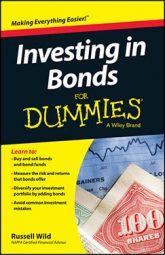So what would you have earned, after taxes, investing in long-term government bonds over the past nine decades or so? Well, compared to stocks, which have returned about 10 percent a year before inflation and 7 percent after inflation, you would have earned squat. With corporate bonds, you'd have earned slightly more than squat. And with short-term government bonds, you'd have earned less than squat.
Keep in mind that all squat figures are rough approximations. The long-term return on all bonds, judging by the past eight decades, is about half that of all stocks. The real return on bonds (after inflation but before taxes) is about one-third that of stocks. For the average taxpayer, the after-tax, long-term return on bonds is very roughly one-quarter that of stocks.
So why even bother to invest in bonds? There are several very good reasons:
Even squat adds up when compounded year after year. Start with $10,000. Give yourself a mere 2 percent annual return, and — voilà — within a century, you'll have $72,450. Granted, you're not going to live another century unless you're from extremely good stock and reading this in diapers, but you get the point, right?
In the last 90 years, stocks clearly clobbered bonds, but the next 90 years could be entirely different. Data from the 1800s show that the returns of stocks and bonds weren't all that different way back when.
Investment-quality bonds have little — practically no — correlation to stocks, so they provide excellent balance to a portfolio. If you want to make sure that you're holding investments that don't all crash at once, stocks and bonds are a sweet mix to have.
At certain times when stocks have tanked, bonds (especially long-term Treasury and high-quality corporate bonds) have rallied, providing comfort to investors when comfort was most needed. Remember 2008.
Unlike just about any other kind of investment, bonds provide steady income for people who need it.
Bonds' limited volatility, as compared to many other investments, makes them good bets for people who can't afford to take much short-term risk.
Even though bonds have earned squat compared to stocks, they are virtual money machines compared to keeping your money in a savings account or money market fund. Passbook savings accounts and money market funds are generally not going to pay you enough to even keep up with inflation. These days, they don't even come close.
Because you're going to take my advice on regularly rebalancing your portfolio, the "drag" of bonds on total portfolio performance will likely be much less than you think.

